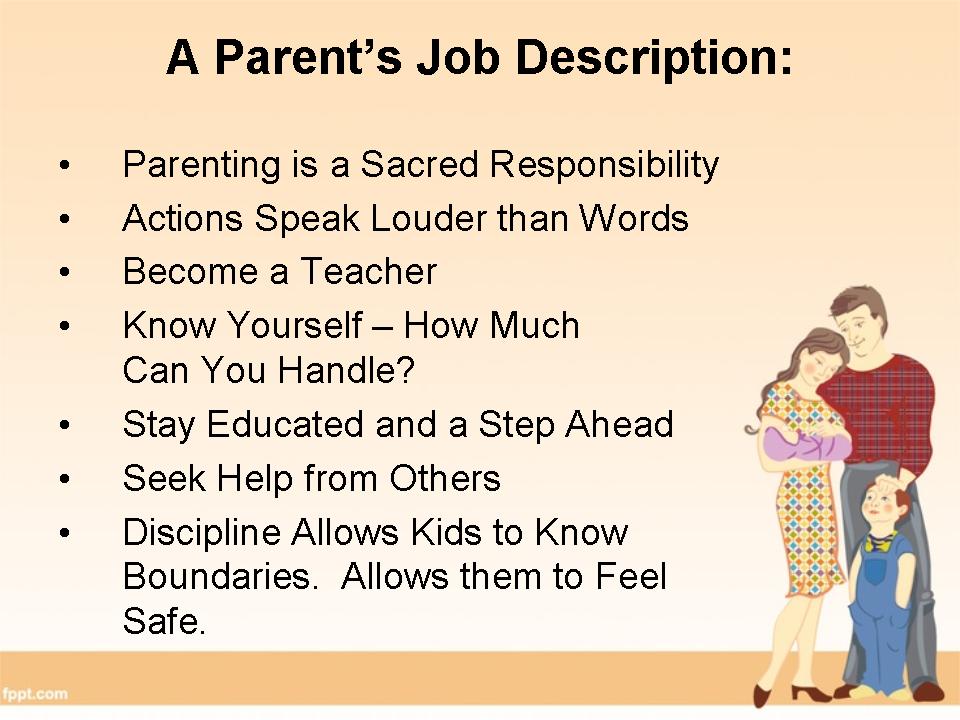What are the predominant parenting styles psychologists talk about? The four that are usually sited are Authoritative, Uninvolved, Authoritarian, and Permissive.
It is generally agreed upon by Psychologists that the Authoritative style is the best one; this way the parent is obviously in charge but never the less is willing to consider an open discussion to an extent and at the same time reserves the right to keep control. There is more thoughtful communication, and it builds trust between parent and child.
An example of this would be explaining to a 7 year old the need to participate in the chores of the household while saying what chores are currently needed & then asking what chores the 7 year old thought he could handle. Chores get put on the refrigerator weekly and are enforced by the parent. If the chores are not done, a consequence is in place.
Uninvolved is the worst possible style. With this style the parents are basically negligent and fail to monitor or supervise their child’s behavior. Some reasons for this may be substance abuse, having no interest in teaching or parenting others, never were parented themselves, overwork and lacking boundaries and consistency with rules because it’s more work to keep the rules than to “let things slide”. It can also be that the parent sort of worships the child and allows them to do anything or is afraid to lose love from the child so is actually afraid to discipline the child. As the child grows older, the parent then becomes truly afraid of the child’s reactions to things. Children do very poorly with this method, generally feel unsafe, neglected, are in trouble a lot, have no reason to follow rules; have no incentives to behave and operate without boundaries.
I once had a client who had so much fun with her 4 year old (worshiping her and being entertained by her) that he actually did not put her to bed, but allowed her to stay up until midnight or longer when the kid just crashed from exhaustion.
Authoritarian is generally a rigid and an overly controlled militaristic way of parenting; it suggests no possibility of discussion with a “my way, or the highway” attitude. Many times an authoritative parent cannot see the grey line, only the black and white of the situation. If the parent fails to be fair in their rules or discipline, the child will hold resentments of being forced to comply. It has been my experience that many kids seem to have an automatic fairness barometer that tells them if they are being incorrectly parented.
A constantly permissive method is also undesirable as it lacks boundaries the child needs to feel safe.
Do parents ever blend these styles? I would argue yes and while consistency is important, a blend of sorts can be beneficial at times depending upon the circumstances. If the majority of the time a parent is Authoritative in their style, Authoritarian may come in handy when trying to make a point. For example, there is absolutely no leeway when it comes to safety. The only discussion to be had there is “it’s my way or the highway” to keep the child safe. Also sometimes parents just feel frazzled and stressed from the day and if they go into a militaristic mode, it’s an opportunity to later approach the child with an apology. By example, the child begins to learn how to also apologize.
Permissive or militaristic can be an excellent way to engage the child in play where they can be the authority and they are the expert and can tell you how to play the game or how to build a fort or whatever. The parent does not get to decide and has to take a backseat in this case and do whatever the child tells them with regard to (safe) ways the game is played. This is a great way for the child to practice teaching the parent something for a change and to practice a different role under appropriate circumstances.
Is consistency a major consideration with parenting styles? Yes, however, most parents can use a little of the permissive and a little of the militaristic under the right circumstances. Uninvolved would only be useful when your child has reached an age where they are responsible for their own life and should be making their own decisions. Then parents need to know when to step back from any parenting style.



